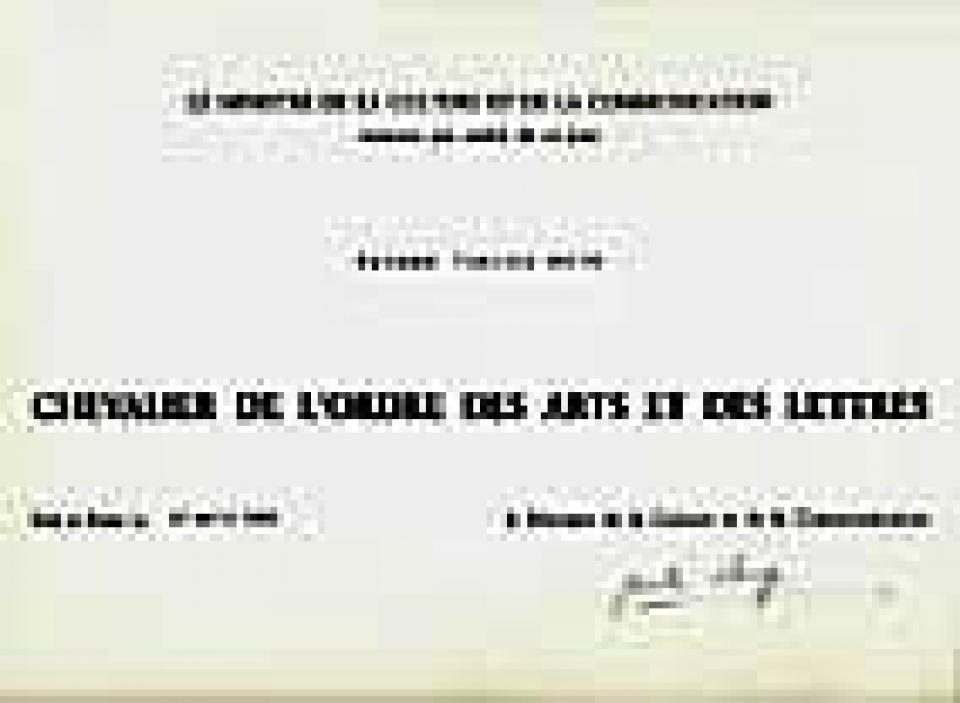Prize ビスケットから勲章

小学校5年のころ、夏休みも終わりに近い地蔵盆ののど自慢大会で「子鹿のバンビ」を歌った。その時の興奮と緊張を今も忘れない。うまく歌えたのかどうか自覚は全くなく、ただもらったビスケットが2枚だったことだけを覚えている。
たぶん、NHKのど自慢でいう鐘2つ。これが、歌で手にしたはじめてのPrize。
20才の夏。日本アマチュアシャンソンコンクールに父が申し込み、たった一曲シャンソンを覚えて参加。4位に入賞した。
「来年、またいらっしゃい。楽しみに待っていますよ」と審査員の人にいわれたのが運命だったかもしれない。ほんのひと夏の冒険のはずが、翌年までの挑戦に変わった。
そして無事優勝したその結果、33年余りの長い冒険はまだつづいている・・・。
「彼女には新人賞を必ずとらせます。」私の担当マネージャーが言った時、皆が笑った。「あいつ、何を言ってんだか。」時代は演歌全盛時代。シャンソン系の歌手がそんなことになろうはずはなかった。私もマネージャーの宣言を恥ずかしいなぁと思っていた。一枚目のシングル「誰も誰も知らない」は不発に終わり、「赤い風船」も爆発的なヒットとは言えなかった。
12月も近づいた秋、「新人賞なんか目じゃないよ。そんなことよりいい歌つくっていいコンサートやって大歌手を目指そう」とマネージャーが私にいった。審査決定の日、新人賞の候補になっていることすら頭になかった二人は、「新人賞に決まったよ」の電話に「誰にですか」と尋ねた。信じられない受賞。運命というよりほかはない。
1969年、はじめて自作曲でヒットとなった「ひとり寝の子守歌」。ベストテン番組に毎日のように出るようになってはいたけれど、何だかどこにいても場違いな気がしていたから、歌唱賞の受賞を聞かされた時には正直、涙が出るほ程うれしかった。雪降る札幌市民会館の楽屋の電話でガタガタふるえながら受話器を持っていたことを今も思い出す。1971年「知床旅情」での歌唱賞受賞とともに歌手生活を大きく支えてくれた。
1989年、17年振りに訪れたパリで、突如コンサートを開くことになり、7月7日にフランス革命二百年を祝うコンサートをユネスコホールで開いた。そのコンサートにムスタキや、フランシス・レイ、コラ・ヴォケール、ムルージなど、あこがれた音楽家たちが客席にいた。
翌日、ピエール・グロスという詩人がホテルに訪ねて来て、「僕の詩でアルバムをつくりませんか」という。彼のフランス語の詩でアルバムが出来るまで二年余り、1992年、アルバム「Cypango」発売。ラ・シガール劇場でのコンサートが実現。
その翌年、『シェバリエ』という文化勲章をフランス政府から頂くことになった。その賞に添えられた言葉は、単にフランスとの関係だけじゃなく、全人格的なことにまで及んでいたことに驚き感動した。受賞を知らずに父が死んでしまったこともあり、賞状を頂いた時は、泣けて困った。
登紀子さんあなたはロシアに近い中国北東で生まれ、中央アジアのジプシー音楽とロシア民謡によって育まれました。
そして二十歳の時、歌にギターというシンプルな形で愛と自由を歌い始められました。不服従と抵抗の人としてあなたは日本の学生の自由の象徴となりました。
エディット・ピアフの世界に導かれ、そしてフランスを訪れ、あなた自身がピアフのオマージュとして作曲した「ペール・ラ・シェーズ」は自由のために死んでいった男達と、愛のために生きた女達に捧げる、愛の讃歌となったのだろうと思います。
あなたのヨーロッパツアーがフランス革命200年祭と同じ年に行われたのも何かの縁なのでしょう。またパリのユネスコホールでコンサートをなさった時、あなたは呼びかけました。「革命は夢を遂げるための手段です。でも大切なのは自分のための革命、自分の信念と行動がひとつになることです。」と。
その翌年あなたはフランスのアーティストと共同製作のレコーディングに取り組まれ、レパートリーの中にフランス語の歌を取り入れられました。あなたは「フランス」をあなたの言葉で歌うことにより人々に広め、そして同時に私たちの心であるフランス語をも広めました。
ここにその感謝の気持ちを申し上げます。
(シュバリエ受賞時に頂いた文章)
When I was a fifth grader, I took a part in an amateur singing contest toward the end of summer vacation at the Bon festival for a guardian deity. I sang “KOJIKA-NO-BAMBI.” I still remember how excited and nervous I felt. I am not sure whether I sang well or not, but I still remember that I received two cookies. I guess that was like what the two gongs mean at an NHK amateur-talent contest. That was the first prize I ever received in my singing career.
During the summer I was 20, my father entered me in the Japan Amateur Chanson Contest. I learned only one chanson to participate in the contest; and I won fourth prize. “Try again next year. We are looking forward to having you,” a judge told me, which might have been my fate. It was supposedly just a summer adventure, however, it became a challenge for the following year. I won the championship, which resulted in a 33-year-long adventure that still continues.
“I will get her to win the prize for ‘new face’ of the year,” said my manager, while everyone laughed. “What is he talking about?” At that time Enka ballads were all the rage. It seemed impossible for a chanson singer to win the prize, and I was embarrassed by his claim. The first single, “Daremo-daremo-shiranai,” didn’t sell well, nor was “Akai-fusen” a big success.
In autumn, nearly December, the manager said to me, “Don’t worry about the ‘new face’ prize. You should aim to become a major singer, producing good songs and holding great concerts.” I didn’t even know that I had been chosen as a candidate for the “new face” prize; we were told on the phone that a new face for the year had been decided, so we asked, “Who?” It was hard to believe that I had won. It must have been fate.
In 1969, my first original song, “Hitorine-no-komoriuta,” become a hit. By that time I was a popular singer who had appeared on the daily TV music program showing the top ten. I felt, however, that I did not fit in anywhere. I was so happy to hear I had won the prize for remarkable singing ability that I cried. I remember I was holding the phone, trembling in a dressing room at Sapporo City Hall on a snowy day. That prize greatly helped me continue my career as a singer, as did another prize given to my song “Shiretoko Ryojou” in 1971.
In 1989, I visited Paris for the first time after 17 years; suddenly it was planned that I would hold a concert. So, on July 7th, celebrating the bicentennial of the French Revolution, I held a concert in UNESCO Hall. I saw many musicians I had admired such as Moustaki, Fancis Lai, Cora Vaucaire and Mouloudji among the audience.
The following day, Pierre Gross, a poet, came to visit me at the hotel where I was staying and asked me if I would be interested in making an album with him, and he would write the lyrics for me. It took us two years to complete the album “Cypango,” which was released in 1992. Half a year later, I held a concert at Laシガール.
The following year I received a Cultural Medal, CHEVALIER, from the French Government. Words accompanying the prize referred to not only the relationship between Japan and France, but also included personal comments about myself that impressed me greatly. When they gave me the certificate of merit I couldn’t help crying, thinking of my father who had already died.

